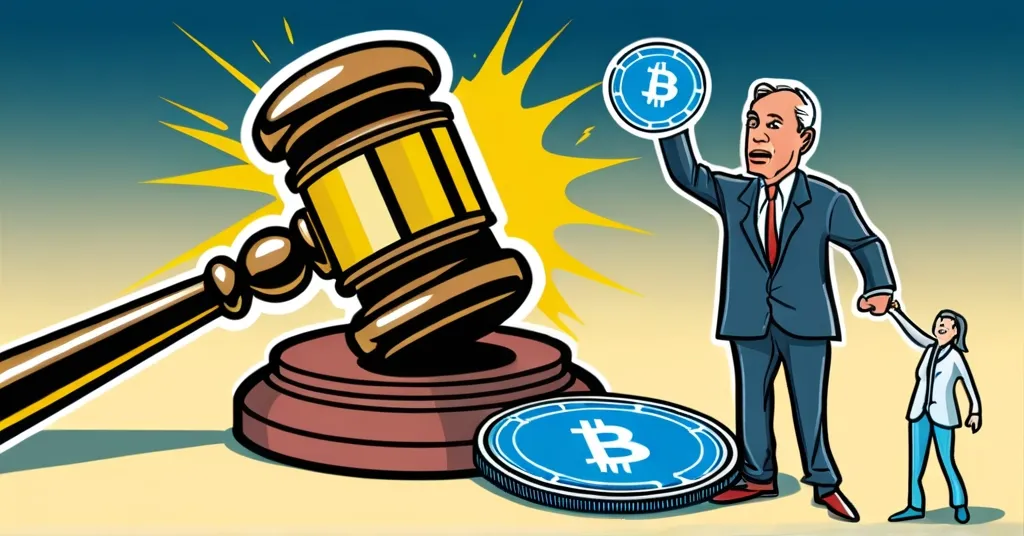IRS Rule Sparks DeFi Lawsuit; SEC Chair Change Could Drop Non-Fraud Cases

Will Non-Fraud Cases Be Dropped Under New SEC Chair? Insights from Amanda Tuminelli
Amanda Tuminelli, Chief Legal Officer at the Defi Education Fund, recently shared her insights on the Thinking Crypto podcast, discussing the IRS’s new tax reporting rule and its potential impact on the DeFi industry. The rule, finalized on December 27th, has sparked controversy and legal action, with industry leaders arguing it’s too broad. Tuminelli also discussed potential changes under a pro-crypto Trump administration, including the anticipated appointment of Paul Atkins as SEC Chair, which could lead to dropping non-fraud cases and providing regulatory clarity.
- IRS tax rule stirs DeFi controversy
- Lawsuit filed by Blockchain Association
- Potential SEC shift under Paul Atkins
- Concerns over DOJ’s approach to developers
The IRS finalized a tax reporting rule on December 27th, aiming to treat decentralized finance (DeFi) participants as brokers. DeFi, which stands for decentralized finance, is a system where financial products and services are provided on a blockchain without a central intermediary. The rule requires brokers of digital assets to report on gross proceeds of sales through Form 1099, similar to securities transactions. However, the DeFi industry argues that the IRS’s definition of a broker is too broad and misdefines the role of DeFi participants.
This has led to a lawsuit by the Blockchain Association and Tech Texas Blockchain Council, who argue that the rule oversteps the IRS’s authority. Marisa Coppel from the Blockchain Association stated, “The IRS has overstepped its authority by expanding the definition of a broker to include DeFi trading front-ends, which do not effectuate transactions.” The rule is set to be implemented in 2025, but reporting obligations won’t start until January 1, 2027.
Tuminelli expressed optimism about potential pushback under a pro-crypto Trump administration. She believes the Congressional Review Act could be used to disapprove the IRS rule before its deadline. “With an incoming pro-crypto administration, I expect there may be pushback or rollback of the rule,” she said. This potential shift in regulatory attitude could have significant implications for the DeFi industry.
Another major change on the horizon is the expected replacement of Gary Gensler as SEC Chair with Paul Atkins. Gensler has been known for his hostile approach towards crypto, while Atkins is viewed as more favorable to the industry. Tuminelli noted, “The appointment of Paul Atkins, who will replace Gary Gensler, could lead to the SEC dropping non-fraud cases and focusing on clearer rules.” This change could reduce litigation and provide much-needed regulatory clarity for the crypto industry.
However, regulatory challenges aren’t the only concern. Tuminelli also raised issues about the Department of Justice’s (DOJ) approach to developers, particularly in cases involving Tornado Cash. She expressed concerns over overly broad criminal liability for creating software tools used by bad actors. “The DOJ’s approach toward developers, particularly in cases like Tornado Cash, could stifle innovation with such broad interpretations,” she warned.
The IRS’s rule aims to ensure that digital asset transactions are reported similarly to securities transactions, helping taxpayers comply with existing tax obligations. Yet, the DeFi industry fears that this could push innovation overseas and infringe on user privacy. Miller Whitehouse-Levine of the DeFi Education Fund expressed disappointment in the IRS’s decision, viewing it as a threat to financial innovation. Lee Bratcher from the Texas Blockchain Council criticized the rule for imposing unrealistic expectations on the digital asset ecosystem, failing to recognize the decentralized nature of the technology.
On the other hand, Aviva Aron-Dine from the U.S. Department of the Treasury emphasized that the new regulations will help ensure all taxpayers have access to the information needed to file taxes accurately, reducing errors and noncompliance. While the IRS’s intentions may be to improve tax compliance, the DeFi industry remains concerned about the broader implications of the rule.
As the crypto community braces for potential shifts in regulatory attitudes, the broader industry support for Paul Atkins as SEC Chair is palpable. His pro-innovation stance could indeed foster a more favorable environment for cryptocurrencies, but only time will tell if these hopes materialize into tangible changes.
The tension between regulatory bodies and the crypto sector continues to evolve, with significant implications for the future of DeFi and the broader digital economy. The industry must navigate these waters carefully, staying informed and ready to adapt to whatever regulatory changes come their way.
Key Takeaways and Questions
- What is the IRS’s new rule on digital asset transactions?
The IRS finalized a tax reporting rule on December 27th, which the DeFi industry argues is too broad and misdefines what constitutes a broker. - Why did the Blockchain Association and Tech Texas Blockchain Council file a lawsuit?
They filed a lawsuit against the IRS because they believe the new tax reporting rule is too broad and does not align with the statutory definition of a broker. - When will the IRS’s rule be implemented, and when will it impose reporting obligations?
The rule is intended to be implemented in 2025, but it will not impose reporting obligations until January 1, 2027. - How might a pro-crypto administration impact the IRS’s rule?
Amanda Tuminelli expects that a pro-crypto administration might push back or roll back the IRS’s rule, potentially using the Congressional Review Act to disapprove it before the deadline. - Who is expected to replace Gary Gensler as SEC Chair, and what impact might this have?
Paul Atkins is expected to replace Gary Gensler. This change could lead to the SEC dropping non-fraud cases and focusing on clearer rules for the crypto industry. - What concerns were raised about the DOJ’s approach to developers?
Concerns were raised about the DOJ’s approach to developers in cases like Tornado Cash, particularly regarding overly broad criminal liability for creating software tools used by bad actors.



